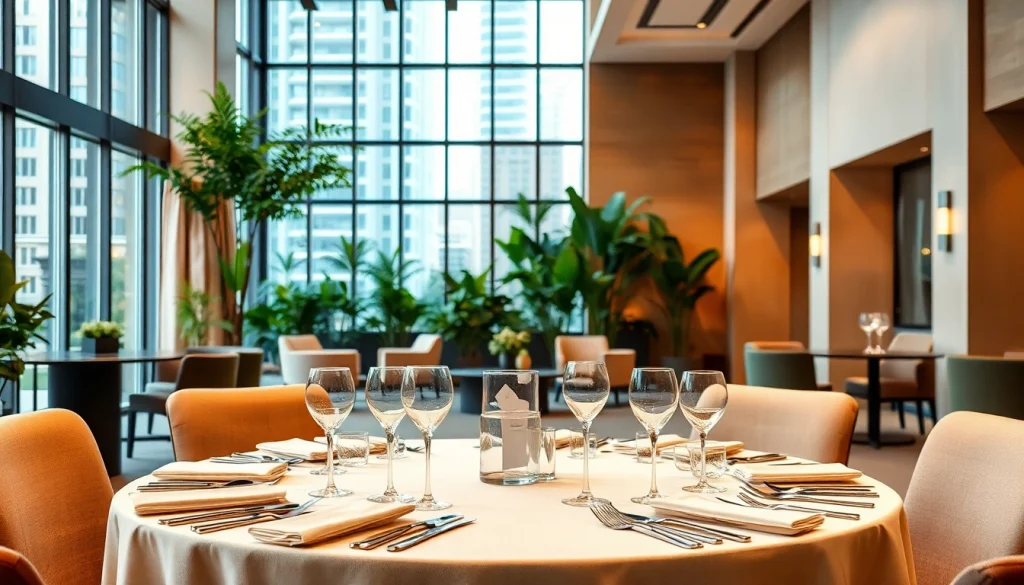
Understanding Your Needs for an Event Space
When planning an event, the venue is often the cornerstone of your experience. The right event space can elevate an occasion, creating an atmosphere that resonates with your guests and serves the purpose of your gathering. Understanding your specific needs is the first step in securing a space that meets expectations and fulfills requirements. In this section, we will explore critical considerations such as defining the event type and purpose, evaluating guest list and capacity requirements, and identifying the ideal location and its accessibility.
Defining Event Type and Purpose
The first step in sourcing the right event space is determining the type of event you are hosting. Is it a corporate meeting, a wedding, a birthday celebration, or a large banquet? Each type of event has its own unique requirements and potential guest expectations. For instance, a formal corporate meeting may necessitate a different layout and technology setup as compared to a casual wedding reception.
Consider the purpose of your event as a guiding principle. For example, if the intention is to foster networking and collaboration, a space that encourages interaction—such as an open layout with breakout areas—could be crucial. Alternatively, if the event revolves around presentations or performances, you’ll need a venue with appropriate audiovisual capabilities. By clearly defining the type of event, you can start narrowing down potential spaces that align with your vision.
Evaluating Guest List and Capacity Requirements
Following the identification of the event type, the next critical factor is determining the size of your guest list and the expected capacity of the venue. It’s essential to find a balance; an overcrowded space can lead to discomfort, while an overly spacious venue may negate the desired atmosphere. As a rule of thumb, always account for both the maximum expected guests and possible last-minute additions.
Make a checklist of your attendees, and consider various factors such as demographics and even the nature of the event. For instance, conferences often require more space for movement and amenities, while intimate gatherings may appreciate cozy settings. Additionally, be sure to account for additional needs, such as seating arrangements and space for staging or activities that may be planned.
Identifying Ideal Location and Accessibility
Location can greatly influence attendance and overall guest satisfaction. Aim for a venue that is easily accessible for your audience. Factors to consider include proximity to public transportation, parking availability, and the overall safety of the area. A convenient location can enhance the guest experience and ensure that attendees arrive on time.
Additionally, think about the venue’s surroundings. Is there accommodation available for out-of-town guests? Are there amenities nearby, such as dining options or entertainment? These aspects contribute meaningfully to the overall event experience. Ensure that the selected event space meets accessibility standards for all guests, with accommodations in place for individuals with disabilities.
Exploring Different Types of Event Space
With a solid understanding of your event’s needs, it’s time to dive into the various types of event spaces available. The venue choice can play a significant role in setting the tone for your event and influencing guest engagement. From outdoor parks to sophisticated indoor halls, the selection is vast, and each option has its advantages.
Indoor versus Outdoor Event Space
Choosing between indoor and outdoor spaces can dramatically alter an event’s atmosphere. Indoor event spaces often provide more control over elements such as climate, lighting, technology, and sound. Additionally, they can be equipped easily with necessary facilities like restrooms and catering services, making them practical for larger event functions.
On the other hand, outdoor event spaces can offer unparalleled ambiance surrounded by nature, offering a certain uniqueness that can enrich the occasion. Considerations like weather impact, available amenities such as tenting options, and accessibility become critical when choosing an outdoor setting. Always have contingency plans and necessary permits in place to ensure a seamless experience, regardless of environmental conditions.
Unique Venues and Their Benefits
In an era where events seek to be distinctive and memorable, exploring unique venues can provide the edge you are looking for. These can include repurposed warehouses, galleries, historical buildings, and even attractions like museums or art installations. Using a non-traditional space can not only differentiate your event but also impress your guests and create lasting memories.
Unique venues often come with their own set of challenges, such as restrictions or unusual layouts. However, the creativity they inspire often leads to innovative event designs. When considering these options, confirm that they align with your logistical needs while also ensuring they meet your audience’s requirements for comfort and accessibility.
Corporate versus Social Gathering Spaces
While many venues can accommodate both corporate and social events, certain characteristics and layouts cater better to one type over the other. Corporate spaces usually require more structured environments with features such as conference rooms, breakout areas, and comprehensive technical setups. On the contrary, social gathering venues focus more on ambiance and flexibility, allowing for mingling and interactive activities.
When selecting a venue, consider the nature of the interactions expected. Corporate events may involve presentations and require seating arrangements that facilitate viewing, while social events might benefit from a more open layout that promotes interaction. Identifying these distinctions will help clarify your venue choice.
Key Features to Consider in an Event Space
Beyond the basic needs outlined earlier, certain features can significantly enhance the functionality and experience of your event. Always scrutinize available amenities, technological capabilities, and accessibility features when evaluating potential event space.
Amenities That Enhance Experience
Adequate amenities are non-negotiable for a successful event. The essential features to consider include restroom accessibility, catering services, furniture like tables and chairs, audio-visual resources, and even Wi-Fi availability. Some venues offer extras like in-house decor, kitchen facilities, and event coordination services.
Request a detailed list of available amenities from venue managers to ensure you are well-informed about what comes included in the rental fees and what may incur additional costs. The right combination of amenities can enhance convenience and improve the overall experience for both hosts and attendees.
Technological Considerations for Events
In our digital age, technology has become a backbone for hosting successful events. As such, it is pivotal to consider the technological capabilities of your chosen venue. This includes the availability and quality of audio-visual equipment, reliable internet access for streaming or presentations, and sufficient power outlets within the event space.
Moreover, if your intention is to host hybrid events (combining in-person and virtual attendees), ensure that the venue facilitates this setup. Don’t hesitate to ask venue managers about technical support staff who may be available during the event to assist with any hiccups that could arise.
Accessibility Features for All Guests
Creating an inclusive environment is essential for any gathering. Accessibility considerations are paramount in choosing the right event space. Verify if the venue offers wheelchair access, elevators, accessible signage, and accommodations for individuals with sensory disabilities.
Speak to venue coordinators to ensure that the space meets national accessibility standards while addressing any specific needs for guests. Making your event accessible is not only a legal requirement in many regions, but also an ethical obligation reflecting a commitment to inclusivity.
Budgeting for Your Event Space
The financial aspects of planning an event cannot be overlooked. Budgeting effectively for your chosen venue involves understanding rental costs, potential additional fees, and negotiating favorable terms. Let’s break down these considerations to ensure financial clarity and prevent unexpected expenses.
Understanding Rental Costs and Hidden Fees
Venue costs can vary significantly based on factors including location, size, and additional services offered. It is crucial to comprehend the complete fee structure associated with an event space. Potential additional costs may include, but are not limited to, cleaning fees, security deposits, overtime charges, and costs associated with third-party services like catering or entertainment.
Request a full breakdown of costs from the venue manager upfront and clarify what is included in the rental price. This diligence can help you avoid surprise expenses as the event date approaches while ensuring you stay within budget.
Negotiating Rates and Booking Terms
It’s often possible to negotiate terms for your event space. This may involve discussing rental rates, security deposits, and payment plans. Seasonality plays a role in pricing; off-peak times can present substantial savings. Additionally, consider the possibility of offering a longer-term relationship, such as booking multiple events at the same venue, potentially adding leverage to your negotiations.
Document all agreed terms in writing to prevent misunderstandings later on, which will also provide peace of mind as you finalize your preparations.
Strategizing on Cost-Saving Options
Finding ways to save on venue costs does not necessarily mean compromising on quality. Explore options such as using a venue that allows outside catering or bringing in your decorations rather than paying for costly packages offered by the space itself. Additionally, consider booking during off-peak seasons or weekdays when rental rates may be significantly lower.
Creating a budget-driven checklist of services and features can facilitate informed decision-making throughout the planning process. Having a solid backup plan for budget overruns, along with some flexibility can help you manage financial challenges seamlessly while ensuring the event remains memorable.
Best Practices for Booking Your Event Space
After determining the right venue, the final stage is ensuring a smooth booking process. Effective planning encompasses timing considerations, site visits, and establishing clear agreements to avoid future hassles.
Timing and Advanced Reservations
Timing is crucial when securing the perfect event space. Start your search well in advance—ideally several months prior to the event. This will increase your chances of booking the desired location and gaining access to favorable rates.
Many popular venues can book out quickly, especially for weekends or holiday seasons. Early reservations can also afford you the flexibility to manage other aspects of planning without feeling rushed. Additionally, keep an eye on cancellation policies, as unforeseen circumstances could alter your plans.
Conducting Site Visits Before Booking
Before you finalize your booking, schedule a site visit to ensure the venue meets your expectations. This is a valuable opportunity to assess the space firsthand, ask additional questions, and visualize your setup. Pay attention to details like cleanliness, the condition of facilities, lighting, and layout options.
Bring along a checklist with your specific requirements and visualize how your event will fit within the space. Never hesitate to take notes or photographs during your visit to reference later, helping ensure you make an informed decision.
Finalizing Agreements and Contracts
Once you’ve found the right venue and completed all necessary checks, it’s time to finalize agreements and contracts. Ensure all terms discussed are accurately captured in your contract, including rental rates, payment structures, durations, and any additional services or features promised to you.
Don’t be afraid to seek clarification on any clauses and ask for alterations if needed. A well-documented agreement protects both parties and establishes professional expectations moving forward, contributing to a successful collaboration.



